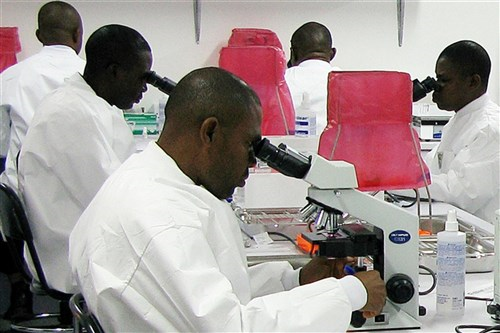USAMRU-K Provides Diagnostics Support for Cholera Outbreak

The current cholera outbreak in Kenya has elicited the need for assistance from the U.S. Army Medical Research Unit - Kenya, a special foreign activity to the U.S. Army Medical Research and Materiel Command's Walter Reed Army Institute of Research.
An acute diarrheal disease caused by a bacterial infection in the intestine, cholera spreads through the consumption of contaminated water, a situation worsened in Kenya by the drought.
The current outbreak of cholera has caused 1,440 cases and 20 deaths since first detected in December 2014.
Due to the disease's breakout from the regions it initially affected in Nairobi, Migori, Homa Bay and Kisii Counties, the Kenyan Ministry of Health referred a suspect sample from Bomet County in southwest Kenya to the USAMRU-K for analysis March 12.
USAMRU-K researchers working at the unit's Microbiology Hub in Kericho confirmed the sample as cholera, and have since tested more than 40 additional samples.
As one of five U.S. Department of Defense overseas research laboratories, the USAMRU-K operates the Kericho facility, which is the only College of American Pathologists-accredited laboratory in Kenya.
The USAMRU-K maintains a long-standing relationship with Kenya's Ministry of Health and the Kenyan Defense Forces, established in 1969 with the Kenyan government's invitation to study African sleeping sickness in western Kenya.
Investigations contributing to the relationship have included that of Dengue, Q fever and Rift Valley fever just in the past year.
Current cholera investigations include a general culture test for a large variety of enteric pathogens as well as genetic analysis to determine if the current outbreak has a single or multiple sources.
The USAMRU-K's culture confirmation of one sample takes only 24-48 hours.
"This is a very good example of how the USAMRU-K is able to leverage its research assets to carry out activities that support the U.S. government's national security strategy and the Africa Command's theater engagement plan," said the USAMRU-K's director of the Department of Emerging Infectious Diseases.
Because of Kenya's large need, the USAMRU-K will obtain a $15,000 Overseas Humanitarian, Disaster and Civic Aid Appropriation from the U.S. AFRICOM to donate supplies and reagents to Kenya's Ministry of Health, which will allow them to conduct more laboratory testing closer to where the outbreaks are occurring.
 An official website of the United States government
An official website of the United States government
 ) or https:// means you've safely connected to the .mil website. Share sensitive information only on official, secure websites.
) or https:// means you've safely connected to the .mil website. Share sensitive information only on official, secure websites.


